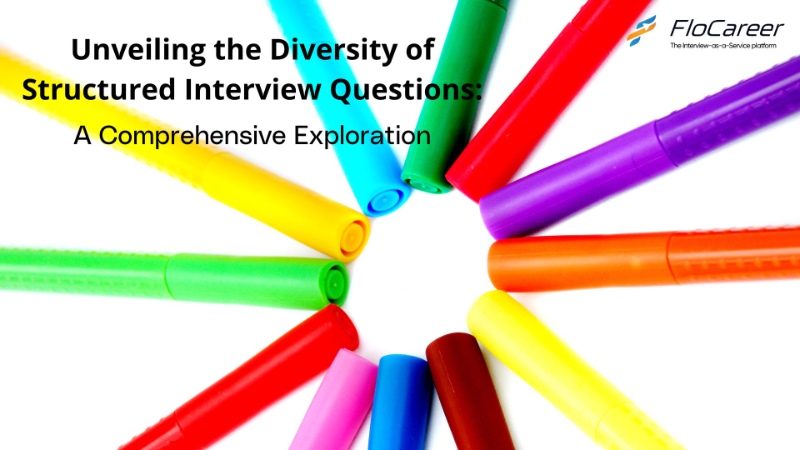Unveiling the Diversity of Structured Interview Questions: A Comprehensive Exploration.
Structured interviews have emerged as a cornerstone in the recruitment landscape, offering a systematic and fair approach to candidate assessment. Within this structured framework, interview questions are strategically categorized to elicit specific insights, ensuring a comprehensive evaluation. Let's delve into the six distinct categories that define the landscape of structured interview questions.

1. Basic Information Questions
- Unveiling the Essentials
Basic information questions form the foundation of a structured interview. These are designed to gather fundamental details about the candidate, such as their educational background, work experience, and other essential qualifications. This category sets the stage for a more in-depth exploration of the candidate's suitability for the role.
2. Resume Questions
- Probing Qualifications and Experiences
Delving into the candidate's resume, this category of questions aims to uncover the specifics of their qualifications and professional experiences. Interviewers strategically explore the details presented in the resume, seeking clarification and deeper insights into the candidate's skills, achievements, and the relevance of their past roles to the current position.
3. Situational Questions
- Evaluating Problem-Solving Skills
Situational questions transport candidates into real-life scenarios, prompting them to showcase their problem-solving abilities. This category assesses how candidates analyze and respond to challenging situations, offering valuable insights into their decision-making processes and their capacity to navigate complexities within the role.
4. Weakness Questions
- Gauging Self-Awareness and Improvement
While often considered a challenging category, weakness questions aim to gauge a candidate's self-awareness and willingness to improve. Interviewers seek authentic reflections on areas where candidates acknowledge they can enhance their skills or competencies. This category provides a glimpse into a candidate's humility and commitment to professional growth.
5. Contribution Questions
- Exploring Value Addition
Contribution questions focus on understanding how candidates envision adding value to the organization. This category delves into their perceptions of teamwork, leadership, and collaboration, allowing interviewers to assess the potential impact a candidate can make within the team and the broader organizational context.
6. Abstract Questions
- Encouraging Thought-Provoking Discourse
Abstract questions introduce a more philosophical and thought-provoking dimension to the interview. By exploring abstract concepts or hypothetical scenarios, interviewers can gauge a candidate's ability to think critically, articulate complex ideas, and demonstrate intellectual agility.
7. Cultural Fit Questions
- Assessing Alignment with Organizational Values
Cultural fit questions delve into the candidate's alignment with the organization's values, mission, and overall work culture. Understanding how candidates perceive and adapt to the existing work environment is crucial in predicting their long-term success within the company.
8. Adaptability and Change Management Questions
- Uncovering Flexibility and Resilience
In a dynamic work landscape, adaptability is paramount. Questions in this category gauge a candidate's ability to navigate change, handle uncertainties, and demonstrate resilience. Employers gain insights into how well candidates can adjust to evolving roles and responsibilities.
9. Leadership and Decision-Making Questions
- Exploring Leadership Styles
Leadership and decision-making questions are tailored to assess a candidate's leadership style, their approach to decision-making, and how they handle responsibilities. This category provides valuable insights into a candidate's potential to take charge and guide teams toward success.
10. Conflict Resolution Questions
- Evaluating Interpersonal Skills
Conflict resolution questions aim to understand how candidates approach and resolve conflicts in the workplace. Strong interpersonal skills are essential for a collaborative work environment, and this category helps identify candidates who can navigate disagreements and contribute to a harmonious workplace.
11. Technology and Innovation Questions
- Probing Tech-Savviness and Creativity
In today's tech-driven world, assessing a candidate's comfort with technology and their innovative thinking is crucial. Questions in this category explore a candidate's familiarity with relevant tools, their ability to adapt to technological advancements, and their creative problem-solving skills.
These additional categories expand the spectrum of structured interview questions, allowing organizations to tailor their assessments to specific roles and desired attributes. Flocareer, as your interview outsourcing partner, ensures that these diverse categories are seamlessly integrated into your structured interview process, providing a holistic evaluation of candidates.
12. Team Collaboration and Communication Questions
- Evaluating Collaboration Skills
Team collaboration and communication questions focus on a candidate's ability to work effectively within a team. These queries assess interpersonal communication skills, conflict resolution within a group setting, and the overall contribution to a positive team dynamic.
13. Goal Alignment Questions
- Assessing Alignment with Organizational Goals
Goal alignment questions probe the candidate's understanding of the company's overarching objectives. This category helps employers gauge whether the candidate's professional aspirations align with the company's mission, ensuring a shared vision for future growth.
14. Time Management and Prioritization Questions
- Evaluating Efficiency and Organization
Time management and prioritization questions explore a candidate's ability to manage tasks efficiently. Employers gain insights into how candidates organize their workload, meet deadlines, and handle competing priorities – crucial skills in a fast-paced work environment.
15. Learning and Development Questions
- Assessing Willingness to Learn
Learning and development questions delve into a candidate's attitude toward continuous learning and professional growth. This category assesses their openness to acquiring new skills, adapting to industry changes, and investing in their ongoing development.
Adding these four categories broadens the scope of structured interview questions, ensuring a comprehensive evaluation of candidates across various dimensions. Flocareer, with its interview outsourcing expertise, seamlessly incorporates these categories into your interview process, enhancing the overall quality and relevance of assessments.
Elevate Your Structured Interview Experience with Flocareer
As organizations embrace the power of structured interviews, optimizing the process becomes paramount. Flocareer, a pioneer in interview outsourcing, offers a strategic solution to enhance the effectiveness of structured interviews.
Outsourcing interviews to Flocareer ensures that each category of structured questions is meticulously crafted and tailored to align with the unique requirements of your organization. The diverse pool of skilled interviewers at Flocareer brings a wealth of experience, contributing to a holistic evaluation of candidates.
Flocareer, with its commitment to excellence and diversity, complements this approach by delivering unbiased and tailored structured interviews. Elevate your hiring process with Flocareer and unlock the full potential of structured interviews.


